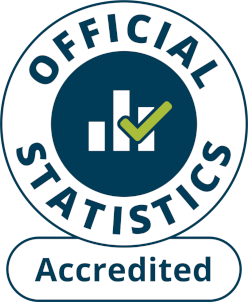DCMS sector economic estimates 2021: employment 2019 to June 2021
Estimates of the number of filled jobs in the DCMS Sectors, for the 2019 calendar year and the year from July 2020 to June 2021.
Documents
Details
This data has been revised since publication.
For DCMS sector data, please see:
- Economic Estimates: Employment and APS earnings in DCMS sectors, January 2023 to December 2023
- Economic Estimates: Employment in DCMS sectors and digital sector, July 2022 to June 2023
For Digital sector data, please see:
Details
Last update: 28 October 2021 Next update: TBC Geographic coverage: UK
Headline Findings
Total filled jobs in DCMS Sectors (excluding tourism) grew by 4.3%, from 4.0 million jobs (12.0% of UK total) in 2019 to 4.2 million jobs (12.7% of all UK jobs) for the 12 months ending June 2021. By comparison, total UK employment fell by 1.6% over the same period, from 33.5 million in 2019, to 33.0 million in July 2020 to June 2021.
The DCMS sector change was primarily driven by growth in the computer programming and consultancy industries (increases of 72 thousand and 65 thousand jobs, respectively) and was partially offset by job losses in the sports sector (65 thousand).
Although there is wide variation between sectors, overall DCMS sectors have lower proportions of workers from less advantaged socio-economic backgrounds, women, and job holders classing themselves as disabled under the Equality Act, than the UK labour force as a whole. On average, DCMS sector jobs have a similar ethnic breakdown to the UK.
Revision note:
Following re-weighting at the ONS of the underlying Annual Population Survey (APS), we have published revised estimates for employment in the DCMS sectors for the period July 2020 to June 2021, using the updated weights.
In these revised estimates, we have also removed the employment estimates for the Creative and Digital occupations, their respective Standard Occupation Classification (SOC) codes, and estimates for socio-economic class of current occupation within the data table. The underlying data from July 2020 to December 2020 uses SOC2010 and the data from January 2021 to June 2021 uses SOC2020. We aren’t currently able to calculate an accurate aggregate estimate for the 12 month period, both because of the challenges of aggregating estimates based on the two different sets of SOC codes and because ONS have identified an issue with the SOC2020 codes.
In these revised estimates, we have also removed the employment estimates for the Creative and Digital occupations, their respective Standard Occupation Classification (SOC) codes, and estimates for socio-economic class of current occupation within the data table. The underlying data from July 2020 to December 2020 uses SOC2010 and the data from January 2021 to June 2021 uses SOC2020. We aren’t currently able to calculate an accurate aggregate estimate for the 12 month period, both because of the challenges of aggregating estimates based on the two different sets of SOC codes and because ONS have identified an issue with the SOC2020 codes.
About this release
These Economic Estimates are Official Statistics used to provide an estimate of employment (number of filled jobs) in the DCMS Sectors, for the calendar year 2019, the year from October 2019 to September 2020, and the year from July 2020 to June 2021. The findings are calculated based on the Office for National Statistics Annual Population Survey (APS).
The statistics have been revised since previous publications to use a new methodology to calculate employment in Civil Society, and to take into account revisions to the underlying dataset published by ONS for the period from October 2019 to September 2020. A revised back series will be published in due course.
Content
The Economic Estimates statistical series covers the contributions of the following DCMS sectors to the UK economy:
- Civil Society
- Creative Industries
- Cultural Sector
- Digital Sector
- Gambling
- Sport
- Telecoms
- Tourism (not included in this release)
A definition for each sector is available in the accompanying technical document along with details of methods and data limitations.
Feedback and consultation
DCMS aims to continuously improve the quality of estimates and better meet user needs. DCMS welcomes feedback on this release. Feedback should be sent to DCMS via email at evidence@dcms.gov.uk.
The UK Statistics Authority
This release is published in accordance with the Code of Practice for Statistics (2018) produced by the UK Statistics Authority (UKSA). The UKSA has the overall objective of promoting and safeguarding the production and publication of official statistics that serve the public good. It monitors and reports on all official statistics, and promotes good practice in this area.
Pre-release access
The accompanying pre-release access document lists ministers and officials who have received privileged early access to this release. In line with best practice, the list has been kept to a minimum and those given access for briefing purposes had a maximum of 24 hours.
Contact
Responsible statistician: Rachel Moyce
For any queries or feedback, please contact evidence@dcms.gov.uk.
Updates to this page
-
Employment data tables have been removed, and a redirect notice has been added to the landing page.
-
Added a revision note referring to the new re-weighted estimates for the period July 2020 to June 2021.
-
First published.
